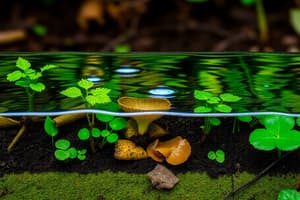Podcast
Questions and Answers
What are ecosystems composed of?
What are ecosystems composed of?
- None of the above
- Only non-living components
- Both living organisms and non-living components (correct)
- Only living organisms
What are the two external factors that control the overall structure of an ecosystem?
What are the two external factors that control the overall structure of an ecosystem?
- Nutrient cycles and energy flows
- Succession and topography
- Climate and parent material (correct)
- Decomposition and root competition
What is primary production in an ecosystem?
What is primary production in an ecosystem?
- The production of water
- The production of oxygen
- The production of energy through photosynthesis (correct)
- The production of food
What are the three types of decomposition processes?
What are the three types of decomposition processes?
What is resilience in an ecosystem?
What is resilience in an ecosystem?
What is the difference between biomes and ecosystem classifications?
What is the difference between biomes and ecosystem classifications?
What is the role of biodiversity in ecosystem function?
What is the role of biodiversity in ecosystem function?
What are some of the human impacts on ecosystems?
What are some of the human impacts on ecosystems?
What is the goal of ecosystem management and restoration?
What is the goal of ecosystem management and restoration?
Flashcards
Ecosystem
Ecosystem
A community of living organisms interacting with their non-living environment as a system.
Ecosystem Components
Ecosystem Components
Ecosystems consist of biotic (living - plants, animals) and abiotic (non-living - water, soil) factors interacting.
Ecosystem Disturbance
Ecosystem Disturbance
A natural process that can impact ecosystem structure and function.
Nutrient Cycling
Nutrient Cycling
Signup and view all the flashcards
Biodiversity
Biodiversity
Signup and view all the flashcards
Ecosystem Services
Ecosystem Services
Signup and view all the flashcards
Ecosystem Degradation
Ecosystem Degradation
Signup and view all the flashcards
Ecosystem Restoration
Ecosystem Restoration
Signup and view all the flashcards
Primary Production
Primary Production
Signup and view all the flashcards
Study Notes
Overview of Ecosystems
-
Ecosystems consist of all the organisms and physical environment with which they interact, linked through nutrient cycles and energy flows.
-
External factors such as climate, parent material, and topography control the overall structure of an ecosystem, while internal factors such as decomposition, root competition, and succession control ecosystem processes.
-
Ecosystems provide goods and services such as water, food, fuel, and medicinal plants, as well as hydrological cycles, air and water cleaning, oxygen production, crop pollination, beauty, inspiration, and research opportunities.
-
Ecosystems can become degraded through human impacts, such as soil loss, air and water pollution, habitat fragmentation, water diversion, fire suppression, and introduced and invasive species.
-
Primary production occurs through photosynthesis, with energy entering the system and being incorporated into plant tissue, which is then consumed by animals and decomposed by microorganisms.
-
Energy and carbon enter ecosystems through photosynthesis, are incorporated into living tissue, transferred to other organisms, and eventually released through respiration.
-
Decomposition processes include leaching, fragmentation, and chemical alteration of dead organic matter, with decomposition rates varying among ecosystems based on physical environment, quantity and quality of dead material, and microbial community.
-
Ecosystems are dynamic and subject to periodic disturbances, with resistance referring to the tendency of an ecosystem to remain close to its equilibrium state, and resilience referring to the capacity of a system to absorb disturbance and retain its function, structure, identity, and feedbacks.
-
Time plays a central role in ecosystem processes, such as the slow development of soil from bare rock and the faster recovery of a community from disturbance.
-
Biomes are general classes or categories of ecosystems, while ecosystem classifications consider all four elements of the definition of ecosystems: a biotic component, an abiotic complex, the interactions between and within them, and the physical space they occupy.
-
The term "ecosystem" was first used in 1935 by British ecologist Arthur Tansley, who refined the term to describe the whole system, including the organism-complex and the complex of physical factors forming the environment.
-
Ecosystem restoration can contribute to achieving the Sustainable Development Goals.Overview of Ecosystems
-
Ecosystems are communities of living organisms and non-living components of the environment interacting as a system.
-
Ecosystems have structural and functional components that include biotic (living) and abiotic (non-living) factors.
-
Disturbance is a natural process and can have long-lasting impacts on ecosystem function and structure.
-
Nutrient cycling is a critical process in ecosystem function, with nitrogen and phosphorus being the most important macronutrients.
-
Biodiversity plays a crucial role in ecosystem function, with species interactions and their relative abundance shaping ecosystem processes.
-
Ecosystem ecology studies interactions between organisms and their environment as an integrated system.
-
Ecosystems can be studied through theoretical, observational, and experimental approaches at different scales.
-
Biomes are general categories of ecosystems, defined by their structure and geography.
-
Human activities have significant impacts on ecosystems, including the provision of ecosystem goods and services.
-
Ecosystem services are being assigned economic values to help inform decision-makers and promote sustainable development.
-
Ecosystems are threatened by human activities, including environmental pollution, climate change, and biodiversity loss.
-
Ecosystem management and restoration aim to promote long-term sustainability of ecosystem goods and services while addressing conservation and human livelihood concerns.
Studying That Suits You
Use AI to generate personalized quizzes and flashcards to suit your learning preferences.




